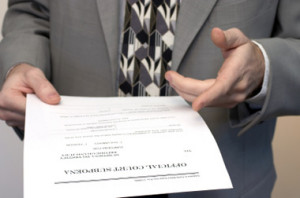 All the rules related to the serving process in Florida can be difficult to keep up with, especially since they can differ from county to county. Generally speaking, process should always be served to the person named in the documents, in person, or to another person residing in the same home who is over 15 years old. However, this isn’t always possible. That’s why the state of Florida has passed laws governing the process server industry here. Included in these laws is how to handle situations where the person named in the process documents cannot be served in person. In this post, we’ll discuss the situations where serving someone other than the named process recipient is acceptable.
All the rules related to the serving process in Florida can be difficult to keep up with, especially since they can differ from county to county. Generally speaking, process should always be served to the person named in the documents, in person, or to another person residing in the same home who is over 15 years old. However, this isn’t always possible. That’s why the state of Florida has passed laws governing the process server industry here. Included in these laws is how to handle situations where the person named in the process documents cannot be served in person. In this post, we’ll discuss the situations where serving someone other than the named process recipient is acceptable.
Serving a Spouse
Serving the spouse of the person named in the process documents, as long as the court proceedings are not adversarial between the two parties and they both live in the same dwelling, is acceptable. This service does not have to occur at the shared home.
Serving a Sole Proprietor at Their Place of Business
If the process is for a sole proprietor that owns a brick-and-mortar business with posted business hours may be served at that business location, during those posted business hours. If the sole proprietor is not available after two service attempts at that location, the manager on duty may be served in the sole proprietor’s stead.
Serving a Private Mailbox
If after diligent searching the only known address that the process server can find is a private mailbox (including virtual offices, executive suites, and mini suites), then the server may deliver the process to the manager of the private mailbox, assuming the server can prove that the intended recipient receives mail there.
Serving a Minor
Anyone under the age of 18 that has never been married must be served by delivering the process to their parent or guardian, including guardian ad litem. Minors who are or have been married in the past are treated as adults.
Serving the Incompetent
If a person has been deemed incompetent but named in the court process, their caregiver, court-appointed guardian, or guardian ad litem must receive the process on their behalf.
Serving a Partnership, LLC, or Corporation
An effort must be made to serve the managing partners, registered agents, or top-level executives first when dealing with business entities. If those are not available, efforts should be made to locate and serve the highest ranking person within the organization that resides or does business in the state of Florida. If no management figures can be located, service on any person in charge of the business during regular business hours is allowed. If the business has no brick-and-mortar locations but has sales representatives or others doing business on their behalf in Florida, any one of those persons may be served. If all else fails, the Secretary of State may be served on the business’s behalf.
Serving a Nonresident
In many cases, especially those related to motor vehicle accidents, the person named in the process is not a resident of the state of Florida. In those cases, when the person’s location cannot be otherwise determined, the Secretary of State accepts service on their behalf and works with other agencies to locate the person.
Serving an Evasive Litigant
Finally, we have those defendants and even witnesses that do not want to be found. In these cases, the process server must make sufficient effort to locate the person at their home, work, or other known addresses. If after at least two service attempts, the process server may request that they be authorized to leave the process with anyone at the named recipient’s known residence who is over 15 years old. In cases where no one else lives with the named recipient, the process server may request to publish a notice that they are looking for the recipient in the local newspaper (referred to as service by publication).
Process Servers in Pensacola
If you need to serve a defendant or witness in the Pensacola area, contact Accurate Serve® for assistance. Our servers know how to find even the most elusive process recipients. In the rare case that we cannot locate the recipient, we’ll work with the local courts to provide substitute service as permitted by law. Call us at (850) 264-2917 or send us a work request online today.





